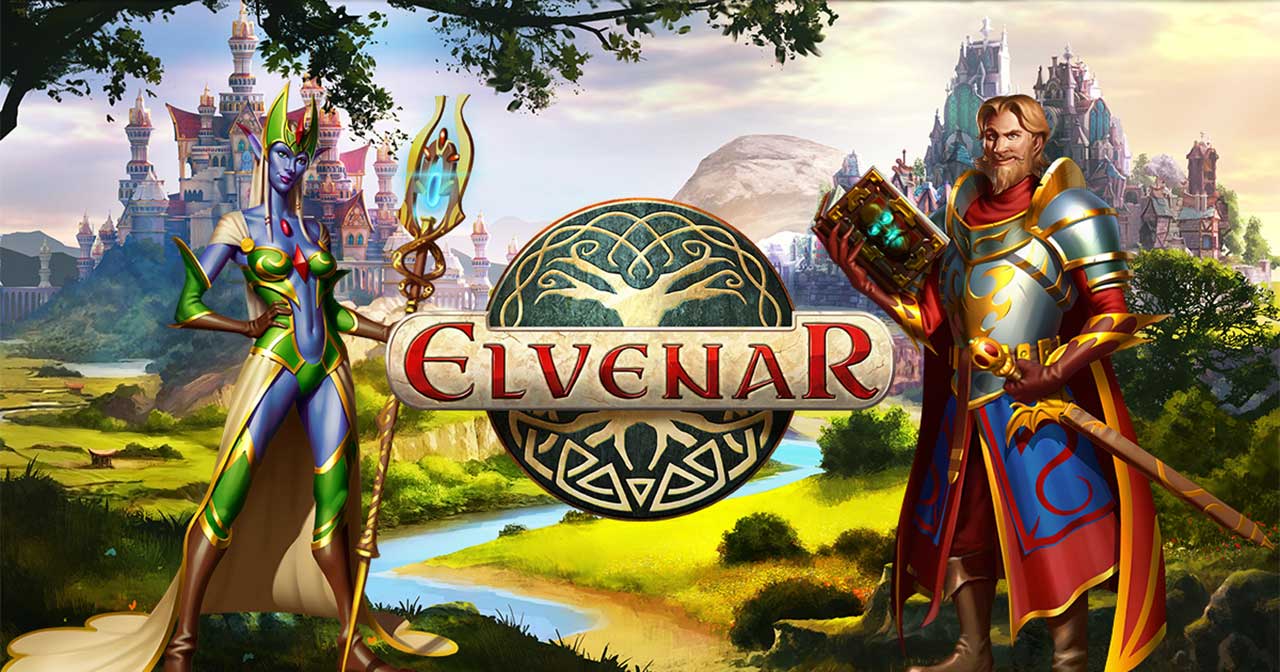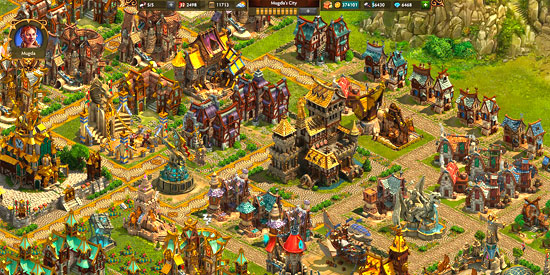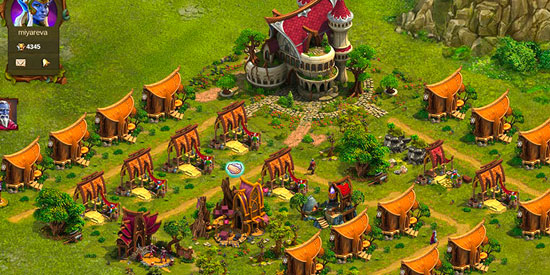
Elvenar
| Genre: Strategy |
| Rating: |
Build it, shape it, lose yourself in it—Elvenar isn’t just a city-building game, it’s a beautifully choreographed waltz between fantasy and strategy that doesn’t care how fast you tap, just how wisely you plan.


A Fantasy Game That’s Less About Wands and More About Wonder
So here’s the thing—Elvenar doesn’t try to sweep you off your feet with dramatic battles or jaw-dropping cinematics. It plays a different tune. This game, brought to life by InnoGames, quietly invites you to breathe life into a city that grows with you, step by careful step. You're not just building a city—you’re choosing a culture. Will you lead the elegant Elves, masters of magic and art? Or the practical, industrious Humans, with their focus on engineering and architecture?
And you know what? That decision isn't just cosmetic. It changes the entire vibe of your city—from the architecture to the units, to how your citizens go about their daily lives.
Let’s Talk Mechanics Without Putting You to Sleep
At its core, Elvenar is about constructing and managing a thriving city, but the rhythm is slower and more methodical than you might expect. It’s almost meditative. You start with a blank map, a handful of resources, and a population that’s a bit too optimistic for the situation. Then—brick by brick—you turn that small outpost into a majestic civilization.
You manage:
-
Residences (they bring in coins)
-
Workshops (for supplies)
-
Culture buildings (which... okay, they look nice and boost productivity)
-
Armories, barracks, training grounds—the usual suspects
But here’s where it gets interesting. The space is limited, and each building has its own footprint. Planning isn’t just about what to build, but where to place it. Some layouts look gorgeous but are inefficient. Others may be clunky but optimized. That tension between form and function? That’s where the game quietly hooks you.
Ever tried reorganizing your living room only to realize your couch blocks the power outlet? Elvenar gives you that same oddly satisfying frustration.
It’s All About the Long Game
Look, if you're someone who wants instant gratification, this might not be your jam. Elvenar is a slow burn—like tending a bonsai tree or waiting for sourdough to rise. Buildings take time. Research takes time. Expanding takes time. You’re not bulldozing and rebuilding every few minutes. You’re watching something evolve.
And that’s where the payoff is. When your mismatched village finally blossoms into an orderly city with ornamental roads, glowing towers, and thriving trade, it feels like you earned it.
There’s an almost parental pride that comes from seeing a city you designed finally click into place. Honestly? It’s kind of therapeutic.
The Research Tree: Both Friend and Foe
Now let’s chat about the tech tree—because wow, it’s huge. Like, “how many coffee breaks will this take?” kind of huge. It's split into chapters, and each chapter introduces new buildings, units, and concepts. Want to upgrade your barracks? Gotta unlock it. Want to bring in guest races like Dwarves or Fairies later? Gotta crawl through the tree.
At first, this tree feels like a fun roadmap. But several chapters in, it starts to feel like a choose-your-own-adventure where every path ends in “wait three hours.” Still, it adds structure and purpose. There's always something you're working toward—some shiny new upgrade dangling just out of reach.
Sometimes that means checking in twice a day just to queue up progress. Other times, it means stepping away for a bit and letting the game percolate in the background.
Trade Isn’t Optional—It’s the Lifeblood
Now, I’m not going to lie—at first, I tried to play Elvenar like a hermit. Ignoring the trader, hoarding my own goods, and pretending I didn’t need anybody.
Spoiler alert: that doesn’t work.
The goods system is built around boosting certain resources and relying on neighbors for the rest. That means if you're producing Marble, Crystal, and Elixir efficiently, you're going to have a tough time acquiring Steel, Scrolls, and Magic Dust without trading.
It’s an elegant nudge into the social side of the game. You can trade with NPCs, sure, but they’ll gouge you. Real value comes from trading with fellow players—and surprisingly, it’s not as cutthroat as it sounds.
You’ll end up joining a fellowship, which is Elvenar's version of a guild. And the longer you stick around, the more you realize that some of the best progress comes from helping others. Whether it’s polishing buildings, joining tournaments, or coordinating trades, there's a real sense of community.
And that’s rare. A lot of strategy games make you feel like everyone’s out to get you. In Elvenar, your neighbors aren’t threats. They’re teammates. That alone makes the game stand out.
Combat: Optional But Surprisingly Strategic
Here’s a twist you might not expect—combat is entirely optional. You can choose to negotiate your way through encounters instead of fighting. But if you do decide to get your hands dirty, you’ll find a surprisingly robust battle system under the hood.
Fights play out on a hex grid with turn-based mechanics, kind of like chess meets rock-paper-scissors. Positioning matters. Unit types matter. Terrain matters. And the AI isn’t half bad.
You’re not controlling armies of thousands—this isn’t some total war simulation. Instead, it feels more like a tactical skirmish. A thoughtful chess match where the wrong move can cost you, but smart planning makes you feel like a genius.
That said, you don’t have to engage with it if it’s not your thing. And I appreciate that. Some days I just want to build pretty houses and rearrange my street lamps. Is that weird? Probably. But Elvenar gets it.
Graphics and Atmosphere: A Living Storybook
Now, I’m a sucker for good art direction. And Elvenar? It absolutely nails the aesthetic. This isn't the gritty realism of a medieval RTS or the cartoonish pop of a mobile clicker. It’s soft. Lush. Magical.
Elven cities shimmer with arcane energy—trees twist into spires, streets glow softly under moonlight. Human cities are more grounded, with rustic stone walls, windmills, and detailed cobblestone paths.
Zoom in, and you’ll catch little details—birds flying, fountains trickling, people bustling around. It’s not just window dressing; it adds life. It makes your city feel like it’s breathing.
Honestly, sometimes I just sit back and watch it move. It's that cozy.
Events: The Candy Sprinkles on Your Strategy Sundae
Let’s not forget the seasonal events. They pop up regularly, usually tied to real-world holidays or fantasy themes. Think Harvest Festivals, Winter Magic, or Carnival of Animals.
These events toss in mini-quests, limited buildings, and a fun bit of chaos that temporarily shakes up your routine. They add flavor—and sometimes pressure—but they’re also great opportunities to snag unique items.
Some of these event buildings are gorgeous, too. And practical. They often produce multiple resources and can shift your strategy depending on what you win. Do you chase the building that gives you mana? Or the one that boosts culture and looks like a golden unicorn temple?
These are the kinds of delightful “problems” that make Elvenar shine.
Slow Isn’t a Flaw—It’s a Feature
You know what? It’s refreshing to play something that isn’t constantly shouting for your attention. Elvenar doesn't need you every five minutes. It’s more like a good friend who’s always around, happy to see you, but never needy.
You can check in a few times a day, queue up some builds, trade a little, chat with your fellowship, and then go about your life. It fits into your day rather than trying to be your day.
That might sound like a weird compliment, but it’s rare. Most games—especially in this genre—are all about urgency. “Hurry up! Come back! Don’t miss this!” Elvenar is more like, “Hey, no rush. We’ll be here when you’re ready.”
And there’s something peaceful in that.
The Verdict: A City-Builder With Soul
So, is Elvenar worth your time? If you like games that reward patience, creativity, and strategic planning, absolutely. It’s not trying to be the flashiest title on the block. It doesn’t scream for your attention. It hums.
It hums with care, with charm, and with a level of polish that shows just how much love went into its creation. It respects your time and gives you something thoughtful in return.
No, it won’t be for everyone. But if you’ve got a soft spot for slow, satisfying strategy—where every building you place has purpose, and every decision gently nudges your city forward—then Elvenar might just be your next favorite escape.
Just don’t blame me when you start rearranging your city grid at 1AM because that one tree is two tiles off-center.
s